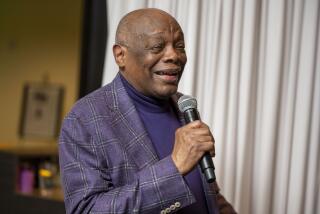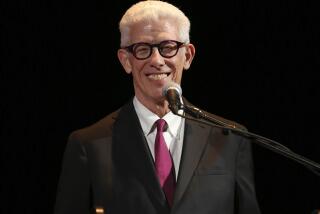Morris Polan, 78; Cal State L.A. Librarian
Few librarians fit the musty stereotypes of their profession, but none defied them more than Morris Polan.
The university librarian of Cal State L.A. for more than two decades, he cherished books, of course, and was an omnivorous reader.
But how many librarians would sit outside in a booth, a la the Lucy character in the “Peanuts” strip, with a sign that says “Librarian Is In”? Or could work a room like a pol? Or print up buttons supporting the late California Chief Justice Rose Bird when she was battling for confirmation? Or flaunt a bow tie collection as impressive as Imelda Marcos’ cache of shoes?
How many librarians have wanted to retire on Bastille Day, the holiday commemorating the fall of the French monarchy, because it was funny?
Morrie Polan, who died of heart failure March 23 in Los Angeles at age 78, did all that and more.
Once described by a colleague as a “man of mystery” because of his many sides, Polan was, in addition to being a librarian, a political junkie, bon vivant, aggressive defender of the English language and sartorial wonder.
For 23 years, he was university librarian at the sprawling, monochromatic commuter campus above the San Bernardino Freeway on the Eastside.
During that time he oversaw the construction of the John F. Kennedy Memorial Library and tripled the size of its collection. He later supervised its restoration after the calamitous 1987 Whittier earthquake, which collapsed a bridge between the library’s wings and unshelved half of its nearly 1 million volumes.
Although he managed to reopen the facility within four months, the closure seemed an eternity to students whose term papers were due yesterday. As a stopgap measure, Polan launched the Hemingway Express, a van that shuttled to other libraries daily, borrowing copies of books buried in the disorderly mounds left by the disaster.
He named the van not for the obvious reason--books, famous writer, Hemingway!--but because Polan was fond of the famous scene in the author’s “For Whom the Bell Tolls” in which the besotted lovers feel the earth move.
Another time, Polan printed plastic bags for borrowers to use on rainy days. The outside of each bag was decorated with the faces of memorable characters, from Humpty Dumpty to Albert Einstein. In the middle was the smiling Morrie Polan.
“He had [an attitude of] let’s change the world through librarianship, through reading, through intellectual life.... He had an extraordinary joyousness that made him a leader in our profession,” said state Librarian Kevin Starr, who puts Polan in the same league as the great Lawrence Clark Powell of UCLA’s Powell Library and Althea Hester Warren of the Los Angeles Public Library.
In nearly the same breath, Starr seems compelled to note that Polan also was “the bow tie champion of Southern California,” known for his assortment of neckwear and overall panache.
“He was a man who liked to be out and about,” Starr added. “He liked the glamour of the night, the reception, the people, the waving across the room to someone he knew. He had this festive social quality. He carried the flag for our profession that way.”
The native of East St. Louis, Ill., who earned a bachelor’s degree in political science from UCLA and a master’s in library science from USC, was as likely to be found at a fund-raiser swimming with political hacks as at a gathering of academics. He was a devoted Democrat who could work a room with the verve of an officeholder facing reelection, and he was a friend of two governors named Brown.
He met former Gov. Jerry Brown at Lucy’s El Adobe Cafe, a Melrose Avenue hangout that attracted an unusual array of thinkers, doers and glitterati.
Polan loved to sit with owners Frank and Lucy Casado and talk politics and philosophy. He was the short, natty gentleman with the carefully groomed beard and weakness for Savile Row suits and Turnbull & Asser shirts.
“Dress British and think Yiddish,” he often said.
Polan had a stern side too.
Heaven help the public figure who regularly corrupted the phrase “in regard to” by adding an “s” to the end of “regard.” Such transgressors were bound to meet Morrie Polan, self-appointed guardian of the English language.
“What is essential to say about Morrie is he had such an incredibly deep love for the English language and good writing,” said Ann Bradley, the associate director of media relations for the Music Center, who met Polan when she was an undergraduate at Cal State L.A. in the 1970s.
Polan once was a guest at an affair attended by many notables. He saw a jurist who at the time was probably the most famous judge in America. He introduced himself by handing the judge a card that said he belonged to a group devoted to obliterating poor spelling and other illiterate behavior. The judge apparently had repeatedly made the error that most fired Polan’s rockets: He had said “in regards to” numerous times, on national television.
Polan corrected the judge. According to a mortally embarrassed bystander and mutual friend, the judge not only took the criticism in stride but cleaned up his speech. Polan was so pleased, the friend recalled, that he “sent [the judge] a letter of commendation.”
The librarian was also a man known for “acts of selected kindnesses,” said folklorist Norine Dresser, a former Cal State colleague. She barely knew him when, in casual conversation, she mentioned the problems she was having on a research project involving anti-Semitism. She had heard a story about a yearbook for the U.S. Naval Academy at Annapolis that put the picture of a Jewish cadet on a page that was perforated so it could be torn out if anyone found it offensive. But she could not find the proof.
A few months later, she received a phone message from Polan saying he had a book for her. It was a copy of the 1926 edition of The Lucky Bag, the Annapolis annual. “It was a key artifact,” said Dresser, who was able to prove her thesis. It also launched a 30-year friendship.
When Polan decided to retire, he announced it in characteristic style: He chose as his farewell date the 200th anniversary of the end of the French monarchy.
“Timing is everything,” he wrote in a staff memo, rendered partly in French, some months before Bastille Day on July 14, 1989. He wound up leaving early, at the end of 1988. But he did not remain retired long.
Before stepping down as university librarian he had instigated the move onto campus of the Edmund G. “Pat” Brown Institute of Public Affairs, a nonprofit public policy group named after the former governor. In 1992, Polan became the institute’s public affairs coordinator, a position he held until his death.
The job allowed him to freely indulge in policy wonking, to banter with the press, and generally to “be Morrie, the bon vivant he wanted to be all these years,” said Jaime Regalado, the institute’s director. Polan hit the dinner circuit with glee, broadening his already vast network of contacts.
His daughters, Ruth and Miriam (who survive him, along with a grandson), said that if you used Venn diagrams to map their father’s relationships, you would draw some circles that do not touch, others with tiny overlaps and others with huge common areas. “He loved ‘Six Degrees of Separation,’” Ruth said, referring to the movie whose title suggests that almost everyone can be connected to everyone else by way of people they know who know someone else who know someone else, etc.
What the movie overlooked was that in many social chains, Polan probably was the first link.
At a function one night, Regalado and Polan listened to a stirring keynote speech by Norman Mineta, President Bush’s transportation secretary, who was then a senior Democratic congressman from California. Polan did not know Mineta but was “hellbent on making the connection.”
A short while later Regalado noticed his associate beckoning him from across the room, while pulling the congressman by the arm. Discussions ensued, and at the institute’s gala dinner a few years later, the recipient of the Pat Brown Legacy Award was none other than Mineta.
“To this day we have a great relationship with Norm in the new administration,” said Regalado. “That was classic Morrie: down on the floor, making it happen.”
More to Read
Sign up for Essential California
The most important California stories and recommendations in your inbox every morning.
You may occasionally receive promotional content from the Los Angeles Times.











